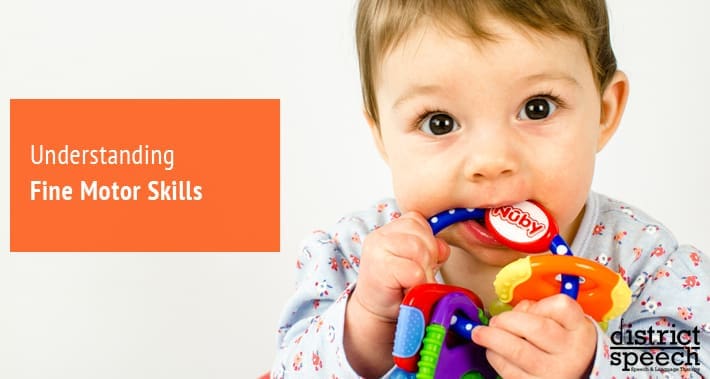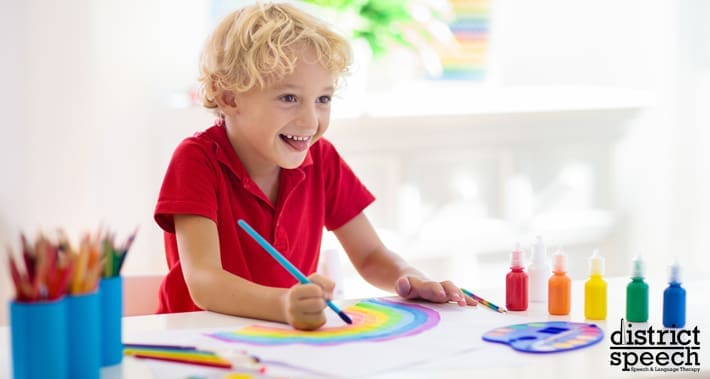
Fine motor skills include any movements that involve the small muscles of our hands and wrists.
These abilities build on your gross motor skills, which involve the large muscles of our torso, arms, and legs.
There are fine motor skills milestones which indicate a general level of childhood development.
These milestones begin as young as 2 months of age, and if your child is significantly delayed, it may be an indicator of a condition that is causing the delay.
Learning disability language therapy is a critical resource to support your child as they develop, and can help them to overcome any challenges that may result.
This is vital for setting your child up to succeed in the world as a self sufficient adult.
The team of licensed therapists at District Speech have a wide range of experience helping children.
Remember, the best age to begin speech therapy is as early as possible.
Now, let’s find out more.
What Are Fine Motor Skills?
Fine motor skills are the abilities used to make movements with the small muscles in your hands and wrists.
These are important small movements that come naturally to many people and are used to accomplish key tasks at work, school, and home.
Fine motor skills require a coordinated effort between your brain and muscles, which can be considered an extension of your gross motor skills.
Some examples of fine motor skills include:
- Using a keyboard
- Using scissors, rulers, and other tools
- Holding a pen or pencil
- Drawing pictures and writing neatly
How Do Fine Motor Skills Develop?
Fine motor skills develop in infancy and continue to improve as your child ages.
Not all children develop at the same pace, but there are general milestones reached at particular ages.
One example of this is that at 5 or 6, children can usually copy shapes and letters.
They can also use a spoon or fork easily.
By 7 or 8, they can tie their shoes on their own.
These are some of the fine motor skills milestones children are expected to meet.
Fine Motor Skills Milestones
Now, as you can imagine there are a number of fine motor skills milestones that begin as early as 2 months.
Keep reading to learn more about early milestones.
By 6 Months
Fine motor skills milestones by 6 months of age include:
- Reaching for objects, even if ineffectively
- Grabbing with both hands or one hand
By 12 Months
Fine motor skills milestones by 12 months of age include:
- Reaching for and grab things
- Putting things in their mouth
- Controlling their release of objects
- Pinching things
- Moving things from one hand to another
- Dropping and pick up toys
By 24 Months
At two years old, fine motor skills milestones include:
- Turning knobs
- Turning pages in books a few at a time
- Creating small stacks of blocks
- Scribbling on a page
- Holding a crayon with their fist
- Painting with whole arm movements
- Feeding themselves
- Drinking from a cup
By 36 Months
By the time your child is 3 years old, fine motor skills milestones include:
- Stringing beads onto a string
- Using scissors
- Turning pages in books one at a time
- Holding their crayon with their thumb and fingers
- Beginning to identify a dominant hand
- Painting with some wrist motions
- Rolling, squeeze, and play with clay or playdough
Activities To Build Fine Motor Skills
Children develop their fine motor skills at different rates.
If they’re a little behind with tasks like holding utensils or pencils, it’s not the end of the world.
There are many ways you can play with your child to improve their fine motor skills.
Some activities you can do together with your child to help them improve are:
- Putty – encouraging your child to squeeze, stretch, pinch, and roll the putty
- Paint – painting with a brush improves manual dexterity and hand-eye coordination
- Water and sponge game – encouraging your child to use the sponge to move water from one bowl to another will improve their fine motor skills
- Kinetic sand – a game that can improve their fine motor skills
- Alpha-Bots – a game that promotes literacy and fine motor skills
- Rice races – a great game to develop fine motor skills is to divide a handful of uncooked rice into two bowls and using tweezers, see who can transfer the rice into an empty bowl first

Conditions Associated With Fine Motor Skills
If your child is incredibly behind with their fine motor skill development, it is worth having them assessed to see if there is an underlying condition.
This is because there are a number of developmental conditions that can impact the development of fine motor skills.
Recent studies identified a correlation between children with fine or gross motor challenges and communication disorders.
Now, let’s go through some of the more common conditions that are associated with fine motor skills challenges.
1. ADD/ADHD
ADD/ADHD is characterized by inattention, hyperactivity, and impulsivity.
Studies have shown that children with ADD/ADHD often have difficulties with their fine motor skills.
It is common for them to have poor handwriting and academic performance as a result of their condition.
This is why it’s so important to have your child assessed so that they can start speech therapy for ADHD to support their development.
2. Dyspraxia
Dyspraxia is primarily a neurological disorder that impacts your ability to plan and process motor tasks.
This includes both fine and gross motor skills.
As a result, it entails problems with movement, judgment, processing, coordination, memory, and other cognitive skills.
Typical symptoms with dyspraxia include:
- Poor posture
- Poor balance
- Fatigue
- Speech challenges
- Poor hand-eye coordination
- Clumsiness
Children with dyspraxia also often have ADHD.
Speech therapy can help support your child with dyspraxia and improve their memory, along with other abilities like processing and movement.
3. Learning Disabilities
Learning disabilities is a blanket term that can cover several types of conditions that can affect anyone’s ability to learn.
The intensity of the effect depends on the nature and degree of the disability.
For example, learning to read may be difficult for your child, so they might need extra help to learn how.
Fine motor skills difficulties are typically indications of either a writing disability like dysgraphia, or a nonverbal learning disability like autism spectrum disorder.
How Can A Speech Therapist Help?
A pediatric speech therapist can help your child with their fine motor skills at any age.
But, if you’re looking for more concrete signs that indicate your child could use a speech therapist, take a look at this list of red flags for speech and language development.
Your speech therapist will examine risk factors, conduct systematic observations, assess their developmental status, and create a varied learning plan to provide therapy based on their assessment data.
In addition, your speech therapist will link their therapy activities to your family activities and school curriculum so that your child continues to develop beyond each session.
The goal is functional progress that can continue across every aspect of your child’s life.
Book Your Appointment With District Speech Today
As you can see, fine motor skills are incredibly important for your child’s development.
And, they can be helped by speech therapists quite effectively.
At District Speech, we have accomplished Washington DC speech pathologists that can help your child to develop their fine motor skills at any age.
Book your appointment with District Speech today.
1300 I St NW, Suite 400 E,
Washington, DC 20005
- https://g.page/districtspeech
District Speech and Language Therapy specializes in speech therapy, physical therapy, and occupational therapy solutions, for both children and adults, in the Washington D.C and the Arlington Virginia areas.